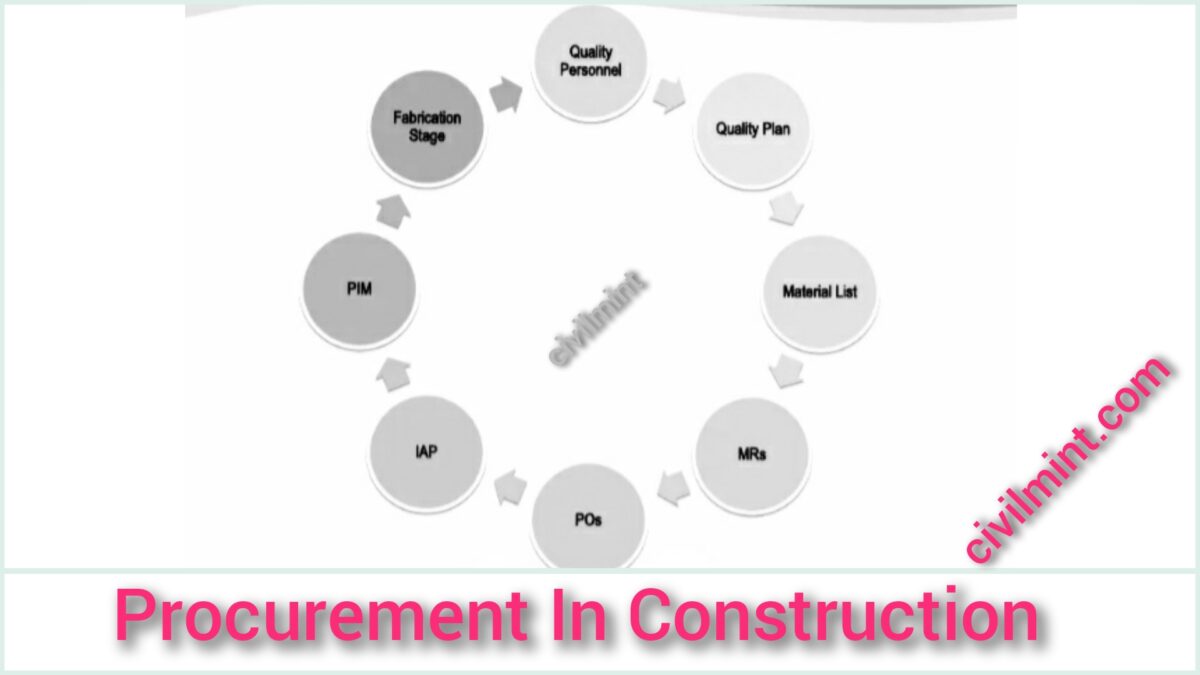This article explains procurement in construction, steps in procurement and advantages of procurement in construction management.

Table of Contents
Definition of Procurement:
Procurement in construction is the process of acquiring the goods and services we need.
Like when we go out for shopping of pair of jeans from Zara or Shoes from puma in this case procurement is pretty straightforward. But in major construction projects up and running the plot thickens when we are looking to acquire all the goods and services.
Procurement in construction management is defined as being an art and manner of securing necessary goods and services with a focus on,
- Acceptable quality.
- Timeliness.
- Reasonable pricing.
- Mitigating and minimizing risk.
- Effective communication and administration.
- Ensuring client satisfaction by understanding their dreams.
All these points can be classified as the Value – getting clients what they need at an acceptable price, without low risk, and with a reliable schedule. This process initially begins with the procurement of the initial project team.
Steps in Project Procurement Management:
In construction management, procurement surrounds all of the goods and services needed to bring the construction project to completion in a timely and satisfying manner.
The following are the steps on which management of a specific deliverable project is laid out.
- Bid evaluation and requests for proposals (RFP). The project manager’s experience with engineers, designers, contractors, and suppliers is invaluable.
- The official procurement management plan is to build here.
- Awarding and signing contracts. when contractors, suppliers, providers have been chosen or procured, the construction project schedule spells out how and when different resources are to be managed with proper milestones clearly defined.
- Monitoring and administering the process of building, including management of the contract, changes in order, quality evaluations on-site, taking performance, etc.
- Debriefing and closing out contracts.
In order to feel for the complexity of procurement management, so let’s take a closer look at the steps involved in the bidding process. It starts with preparing the design documents for work and goes on with the RFP documentation, an invitation to tender. Different suppliers and contractors submit their tenders or proposals, upon which the merits of the potential bids are discussed and weighed. once the provider has been chosen, the contract is confirmed and the service is executed. The definition of contract management and procurement is different. Contract management is the art of creating clear documents where each party knows exactly what is expected of them, the amount of payment.
The procurement process is to be managed by the procurement management and they plan and map out precisely. And to make sure everyone is on the same page there will be a contract for each procured service or product. Procurement is a critical component of supply chain management. For large projects, the merits of a collaborative approach and strategic partnering are obvious.
Advantages Of Procurement In Construction
- Procurement in construction enables construction firms to secure the best deals on materials, equipment, and services, resulting in cost savings and maximized profits.
- By carefully selecting vendors and suppliers, procurement in construction ensures that the materials, equipment, and services used in a construction project meet the required quality standards, leading to improved quality.
- Procurement in construction streamlines the procurement process, reducing the time it takes to find and secure the necessary materials, equipment, and services, resulting in time savings.
- Procurement in construction helps mitigate risk by ensuring that suppliers and vendors meet certain criteria and by having contingency plans in place in case of unforeseen circumstances.
- Procurement in construction provides a clear and documented process for selecting vendors and suppliers, as well as ensuring compliance with regulations and contractual obligations, leading to increased transparency.
- Procurement in construction fosters better relationships with suppliers by providing a structured and consistent process for procurement, as well as ensuring timely payments and fair treatment.
- By streamlining the procurement process and ensuring timely delivery of materials and equipment, procurement in construction improves overall project management and reduces the risk of delays and cost overruns.
- Procurement in construction provides greater flexibility by allowing construction firms to adapt to changing market conditions, such as fluctuations in material prices or availability.
- Procurement in construction enables construction firms to secure the best deals on materials, equipment, and services, improving their competitiveness and winning more business.
- Procurement in construction ensures compliance with regulatory requirements and contractual obligations, reducing the risk of legal and financial penalties.
